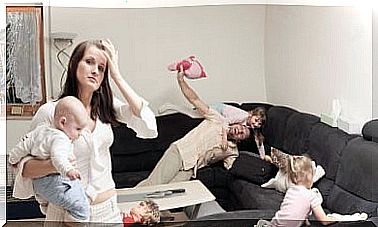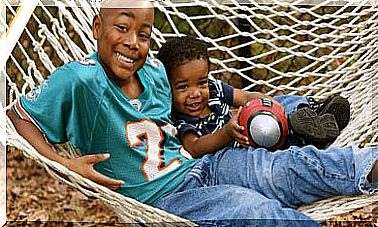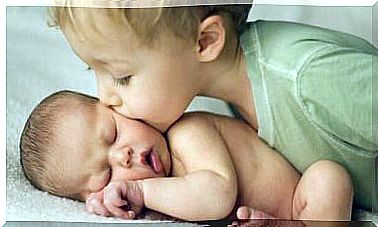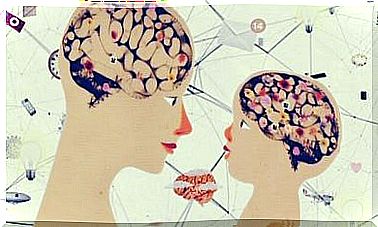When You Make Eye Contact With Your Baby While Breastfeeding

Breastfeeding is so much more than just giving your baby the nutrition he needs to grow. It also creates a bond between you. During this caring, affectionate act, you exchange scents, touch and emotions, and making eye contact with your baby while breastfeeding is magical.
We’re talking about breastfeeding here, but that does not mean we exclude bottle feeding. The contact with your baby in your arms is still there. You can mumble to him in a low voice and your baby’s eyes will search your face.
Believe it or not, there are few moments as important to a child’s development as when it is in its mother’s or father’s arms.
In fact, there are several studies that show this. Children begin the learning process of communication thanks to the interaction with their mother when breastfeeding. Their brains begin to absorb sounds, gestures, tones and individual words, which slowly but surely form the basis of a language.
During this process, feelings of pleasure and well-being are important. While babies are breastfeeding, they are happy and relaxed, which makes them more receptive to learning and connecting with their surroundings. This physical and emotional feeling helps the growth of nerve structures, until one fine day you will be able to make eye contact with your baby while breastfeeding.
We will now talk a little more about this fantastic process.

There are few things in life that are as beautiful as a mother breastfeeding her baby. However, there are many things about breastfeeding that we are not necessarily aware of.
A sophisticated biological mechanism
We know that pregnancy is a chaotic whirlwind of hormones that activate vital processes that build our bond with the baby. Oxytocin is stimulated, for example, when the baby attaches to the breast. This hormone acts in our brain to promote the flow of milk and also strengthen the deep emotional bond.
Something you may not know is that your baby has a very limited field of vision during the first months of life. They can only distinguish objects around 50 centimeters away or closer.
This is due to a very simple fact: the only thing the baby needs to focus on is his mother’s breast or bottle. During the first weeks of life, therefore, your child is guided by only one mind: the scent. So do not worry if you can not make eye contact with your baby while breastfeeding. It’s simply not time.
Eye contact with your baby during breastfeeding usually occurs at 4 months
Each baby matures at its own pace, but it is normal for the baby’s eyes to have the ability to focus and perceive deeply around four months. These are two important processes that will allow the baby to focus his attention on what is most important to him or her: you.
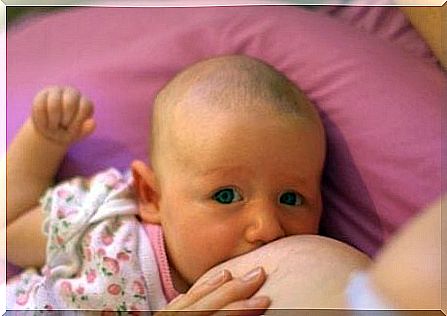
The long moments you share with the baby during breastfeeding are unforgettable. In these cases of subtle intimacy, your words and your touch will gradually broaden your baby’s horizons, until your baby’s eyes can finally find you. Around this age, your child will also start playing with your hair and clothes.
Each child has their own way of breastfeeding. Some are calm, others a little more anxious, but these behaviors will change and mature with each passing week. Your child is growing up before your eyes, and that’s fine.
Your baby is looking for something more than just eye contact
This is important. When your baby starts looking back at you, talk to him. Non-verbal language is important, but the few seconds when your eyes meet is a perfect opportunity to give a little more stimulation.
- When you speak, your baby may respond with a smile. Later it may be a whistle, a giggle and a gesture of curiosity or provocation that makes you continue to interact.
- Do not forget that a baby’s eyes are like doors that must learn to open. Behind them is a whole world that can stimulate you every day through your magic band.
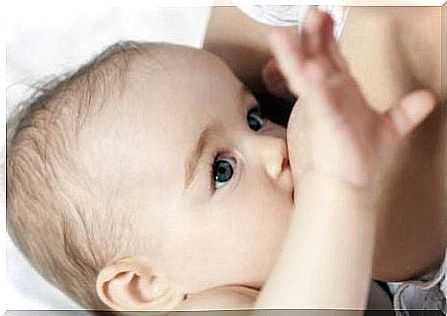
Whatever others say, food and care are not the only things that matter during a baby’s first months. During this time, your baby begins to wake up alive. With every gesture, every touch and every word, you give light to the child’s mind, and with your eyes you guide your child as he or she takes the step into the world.
